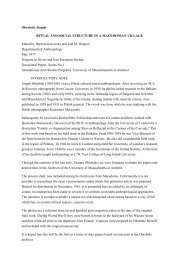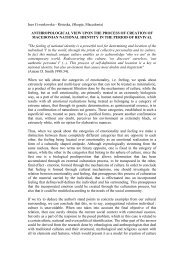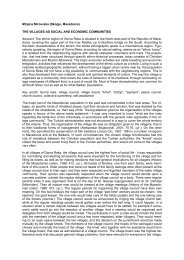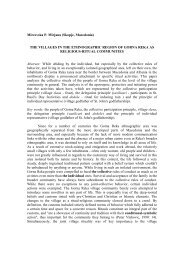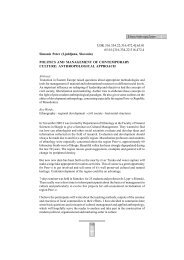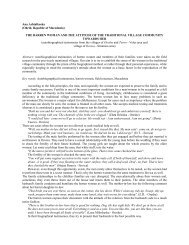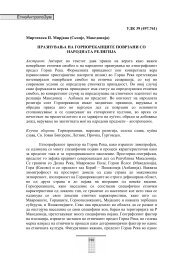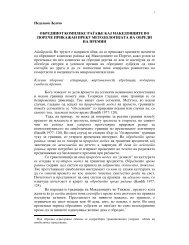Jezernik, Bozidar (Slovenia), The Red and the Black
Jezernik, Bozidar (Slovenia), The Red and the Black
Jezernik, Bozidar (Slovenia), The Red and the Black
You also want an ePaper? Increase the reach of your titles
YUMPU automatically turns print PDFs into web optimized ePapers that Google loves.
EthnoAnthropoZoom<br />
War, <strong>the</strong> custom was also introduced of choirs performing at cemeteries <strong>and</strong><br />
singing funeral songs. In <strong>the</strong> mid 1920s, Celje singers came to <strong>the</strong><br />
underst<strong>and</strong>ing that »power is in style <strong>and</strong> salvation in uniqueness«. <strong>The</strong>y<br />
agreed on a joint appearance at cemeteries for All Saints Day, on <strong>the</strong> grounds<br />
that »politics cannot be found in singing«. <strong>The</strong>y also invited members of <strong>the</strong><br />
choir of <strong>the</strong> Socialist Party to a joint performance but its leaders made it<br />
known to <strong>the</strong> o<strong>the</strong>r singers that members of <strong>the</strong>ir choir were »class conscious«<br />
<strong>and</strong> could not sing with »bourgeois parties«. A reporter in Nova Doba was<br />
angry about such a decision, since a great many »fine proud overcoats with<br />
ragged collars <strong>and</strong> many calloused h<strong>and</strong>s« could be seen at <strong>the</strong> cemeteries<br />
among <strong>the</strong> »bourgeoisie«. Indignant at such a policy, he compared <strong>the</strong> event<br />
to <strong>the</strong> story of an Indian chief <strong>and</strong> <strong>the</strong> Jesuits:<br />
When <strong>the</strong> Spanish came to America, <strong>the</strong>y began – what is true is true –<br />
to treat <strong>the</strong> Indians unconscionably. <strong>The</strong> <strong>Red</strong>skins of course felt violent<br />
hatred towards <strong>the</strong> Spanish. And so something unusual happened: <strong>the</strong><br />
Jesuits, who were propagating Christianity <strong>the</strong>re, converted <strong>the</strong> Indians<br />
so that it would at least be better in <strong>the</strong> next world. A fervent missionary<br />
had already almost completely obtained a prominent Indian chief <strong>and</strong> it<br />
had finally got so far that he wanted to be christened on his deathbed.<br />
When <strong>the</strong> priest told him, that he must also forgive <strong>the</strong> Spaniards<br />
everything, even though his race had suffered so much misfortune, <strong>the</strong><br />
Indian chief hesitated <strong>and</strong> considered. With glazed eyes he stared at <strong>the</strong><br />
bourgeois person in <strong>the</strong> flowing robes <strong>and</strong> asked him: »Do any Spanish<br />
get to heaven, too? Eh?« »Of course, those who live honestly <strong>and</strong><br />
worshipfully.« »Mmm, I don’t want to be with <strong>the</strong>m.« <strong>The</strong> story says<br />
that on this <strong>the</strong> <strong>Red</strong> Indian’s spirit gave out, he turned to <strong>the</strong> wall <strong>and</strong><br />
died unbabtised. However, he quickly began to grow pale <strong>and</strong> lose his<br />
red skin <strong>and</strong> after death became as yellowish as <strong>the</strong> damned Spanish. So<br />
at least after death we are all <strong>the</strong> same, bourgeois <strong>and</strong> proletarian (ca.<br />
1925: 2).<br />
Preserving <strong>the</strong> Past for <strong>the</strong> Future<br />
Although <strong>the</strong> newly created national state of Yugoslavia was multiconfessional,<br />
in 1931 <strong>the</strong> Catholic Feast of All Saints was declared a national<br />
holiday, when all shops <strong>and</strong> barber’s shops had to remain closed (ca. 1931b:<br />
2; 1931c: 2-3). In <strong>the</strong> twentieth century, All Saints Day was already firmly<br />
rooted in tradition (Koštomaj 1923: 1; Gaberc 1925: 1; Kuret 1970: III, 112-<br />
13), so that <strong>the</strong> new state authority, despite being based on a radical break<br />
with <strong>the</strong> past, did not annul it. Although o<strong>the</strong>r religious festivals in <strong>the</strong><br />
Socialist Republic of <strong>Slovenia</strong>, including Easter <strong>and</strong> Christmas, were removed<br />
from <strong>the</strong> calendar of national holidays, 1 November remained coloured red.<br />
Instead of annulling <strong>the</strong> holiday, it wanted to give it a new, secular content, on<br />
35





